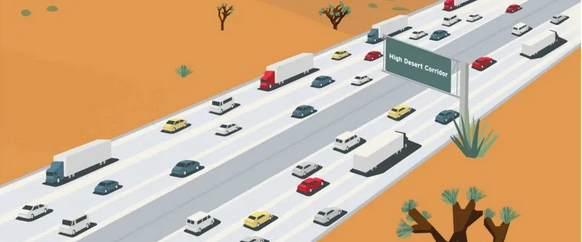A recent court settlement spells the end for the planned High Desert Corridor Freeway. Bryn Lindblad, deputy director of Climate Resolve - one of the plaintiffs - calls the settlement "a victory for smart planning [and against] climate change." Climate Resolve estimates that the freeway would have resulted in four million additional miles being driven every day. Those tailpipes would have contributed major greenhouse gas emissions, exacerbating the planet's climate emergency.
The $8 billion, 63-mile High Desert Corridor freeway would have spanned two counties connecting the north L.A. County cities of Palmdale and Lancaster with San Bernardino County cities of Victorville, Apple Valley, and Adelanto. The route would have gone through a patchwork of privately-owned undeveloped wild lands populated by Joshua Trees.
The L.A. Times had billed the High Desert Freeway as “L.A. County’s first new freeway in 25 years.” CalPIRG called it a top national boondoggle.
At the urging of former L.A. County Supervisor Mike Antonovich, Metro's Measure M sales tax included funding for the L.A. County portion: $170 million available now, slated for property acquisition, and $1.8 billion scheduled for 2063-2067 for construction.
In 2016, Caltrans certified the project's Environmental Impact Report (EIR). The plan was for a High Desert “multi-purpose corridor” featuring an 8-10 lane freeway, plus bike path, solar panels, and high-speed rail.
In late 2016, Climate Resolve - with activists Dr. Tom Williams and Bryan Baker - filed a lawsuit challenging the High Desert Corridor under the California and National Environmental Quality Acts (CEQA and NEPA.) The lawsuit was led by attorneys Mitchell Tsai and James Birkelund. The nonprofit Endangered Habitats League joined the plaintiffs.
When the judge found that the EIR was insufficient with regards to biological and greenhouse gas impacts, Caltrans agreed to essentially shelve the project. In theory, Caltrans could have appealed or quickly gone back to the environmental study phase and completed a Supplemental EIR (SEIR). Instead they signed on to a settlement agreement that halts work on the freeway portion of the project. In the settlement, Caltrans committed to not purchasing land for the proposed freeway until the agency completes the SEIR. The agreement leaves in place the approval of rail and bike components of the project.
Lindblad expects that acquisition and construction may well proceed for the High Desert Corridor railway and bikeway. The L.A. County portion is funded under Measure M. The funding picture for San Bernardino County is not clear, though new railway would connect to Xpress West high-speed rail from Victorville to Las Vegas. That privately-funded rail project is expected to complete construction in 2023.
The High Desert Corridor project's future will be decided by the two-county High Desert Corridor Joint Powers Authority whose board includes L.A. County Supervisor Kathryn Barger. An email inquiry to Barger's office remained unanswered at press time.






